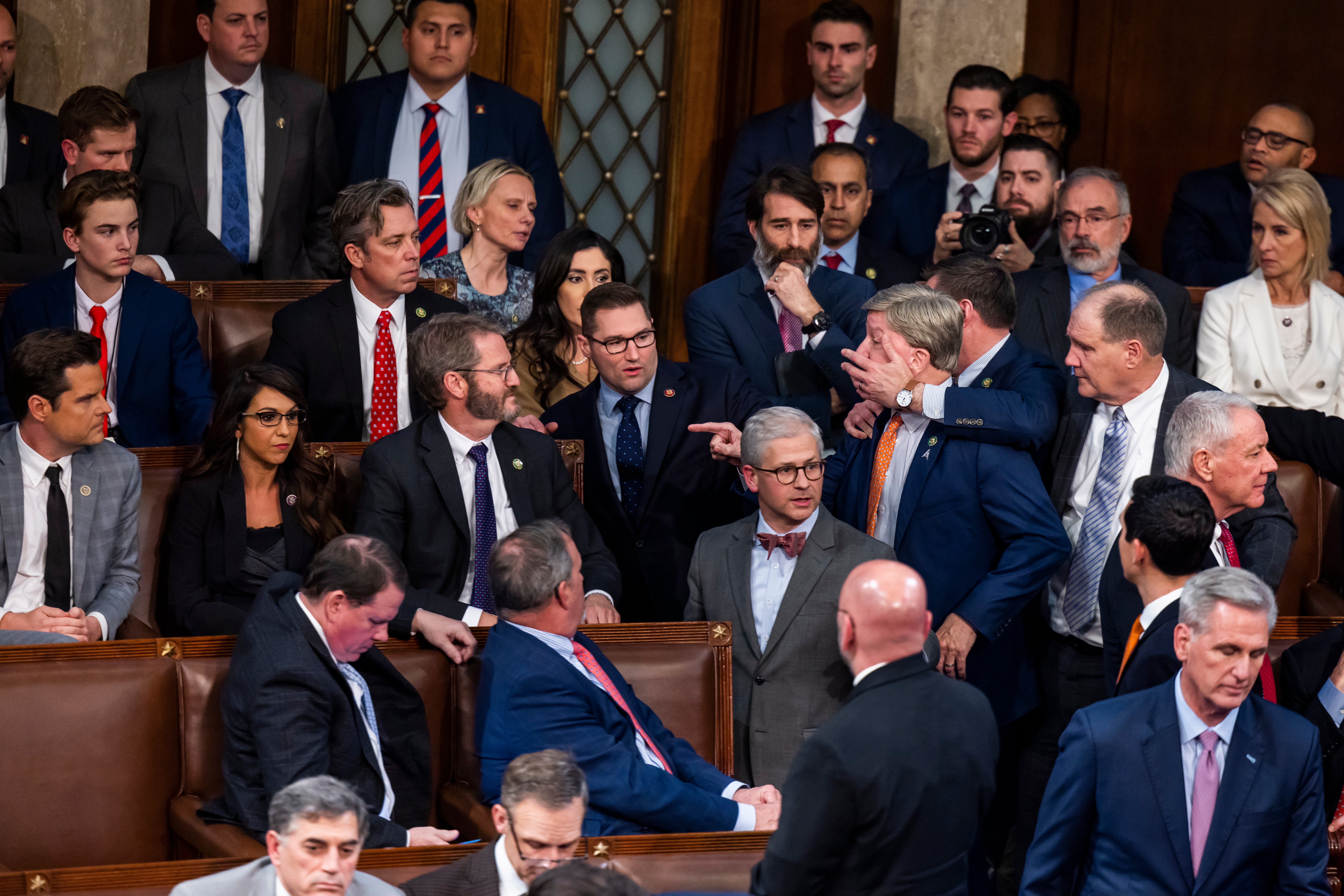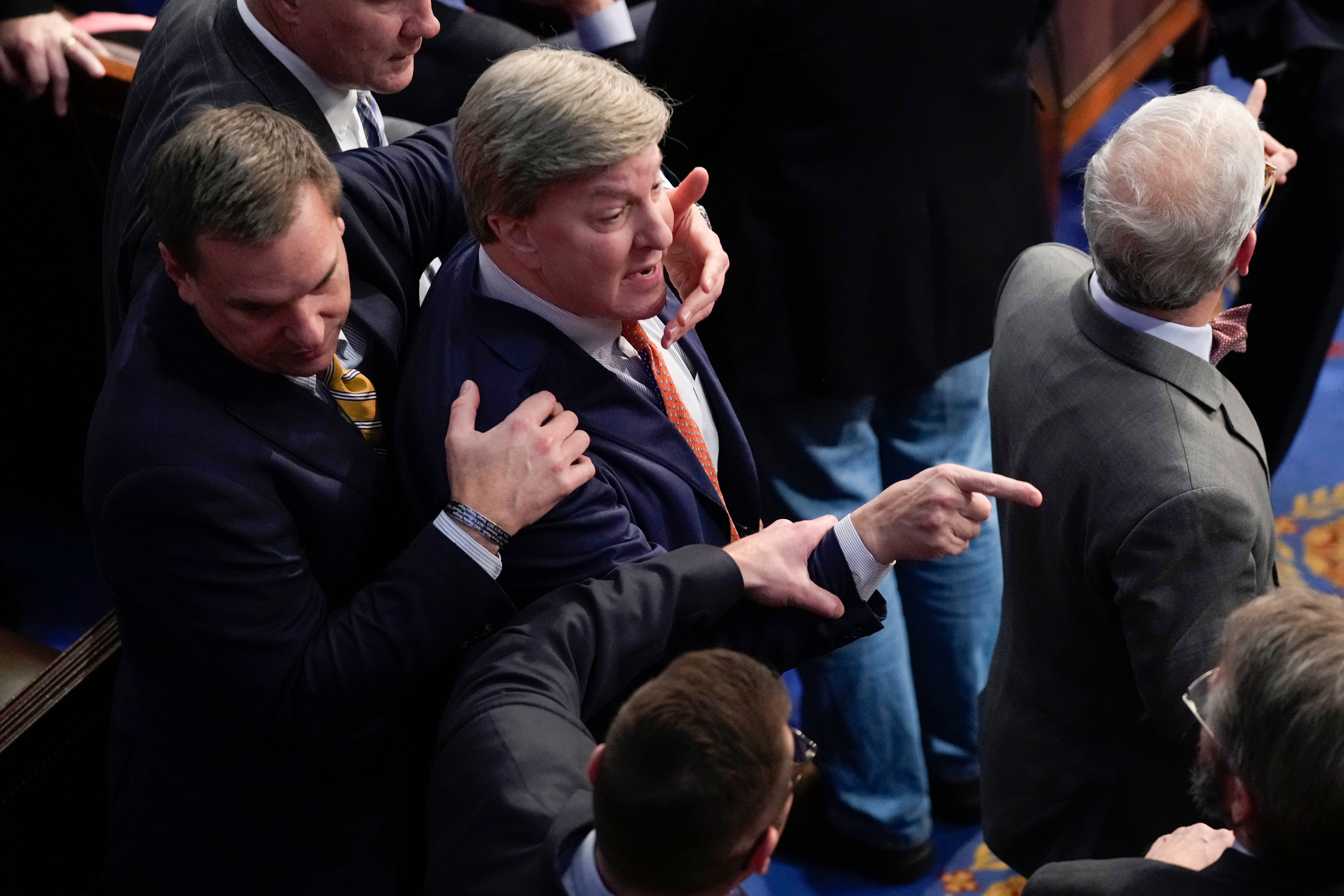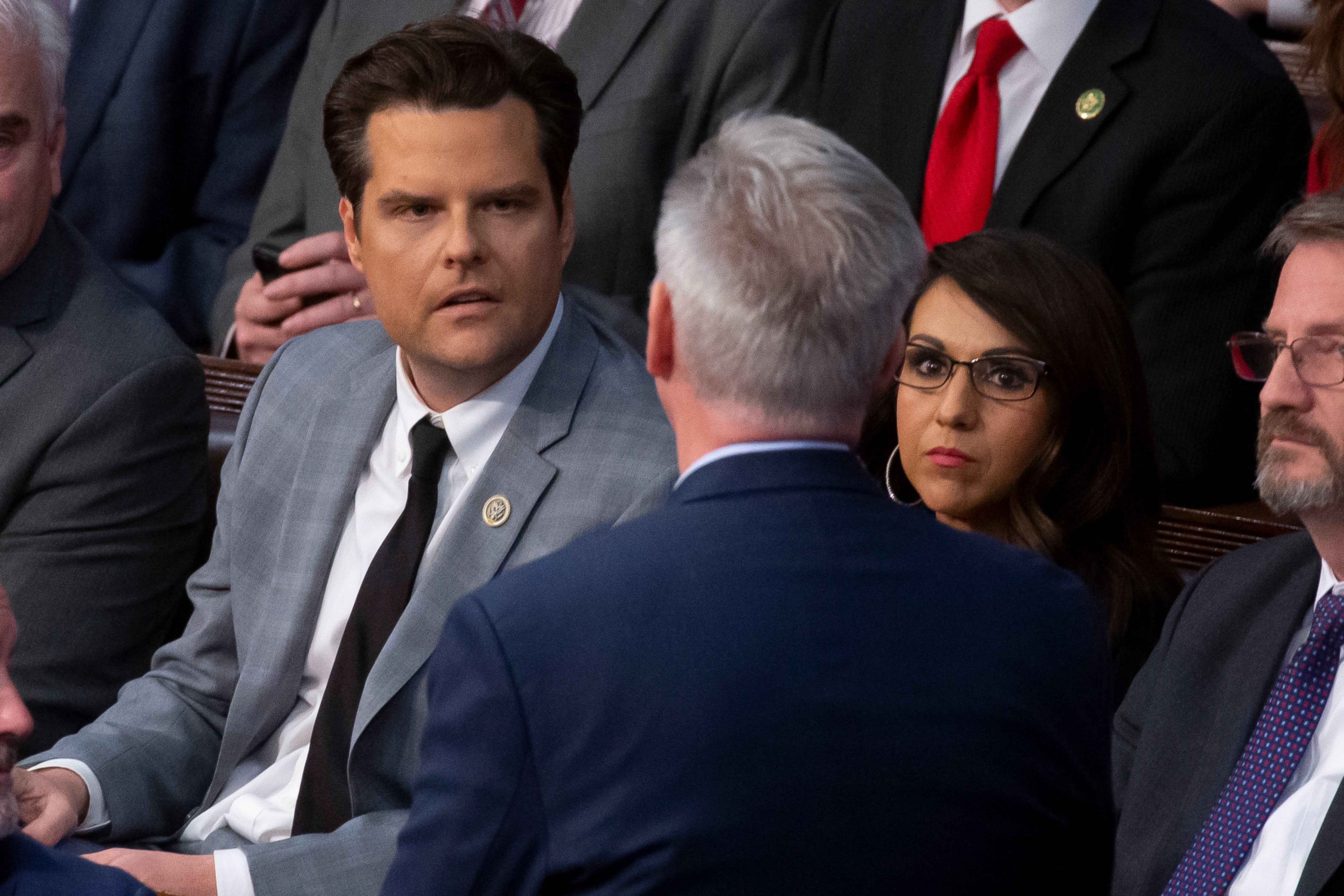Kevin McCarthy elected House speaker on 15th round after fight nearly breaks out
Lawmakers nearly came to blows as historic streak of voting neared dramatic conclusion
The longest contest for speaker of the House of Representatives in more than a century has come to an end with the narrow, dramatic election of House Republican leader Kevin McCarthy to the role.
The California congressman entered the US Capitol on 6 January promising “progress” after repeatedly failing to gain enough votes to secure the gavel.
More than 12 hours later, after several more rounds of voting and frantic negotiations, he finally made some progress at the cost of the stability of his own job as well as serious giveaways in the form of committee assignments for the powerful House Freedom Caucus.
In excess of a dozen Republican members who previously did not support Mr McCarthy’s attempts to take effective control of the lower chamber of Congress were convinced to flip their vote on Friday, though he continued to fall short of enough votes to clinch a victory while drawing up behind-the-scenes concessions to build up his support. Others, like Matt Gaetz and Lauren Boebert, ended their attempts to directly oppose him and thereby lowered the margin by which he would need to claim victory.
Marjorie Taylor Greene, a far-right Republican who stuck with Mr McCarthy throughout the process, walked down the aisle to pose for a photo with the new speaker as the final vote was tallied.
After adjourning in the afternoon, lawmakers reconvened on Friday night for the 14th and 15th votes to determine the speakership, ending Mr McCarthy’s historic streak of failures and the longest election for the title in 164 years, underscoring the fragile moment in American democracy on the two-year anniversary of the 6 January insurrection while nearly exploding into blows among lawmakers.
The four-day process has previewed incoming House Republicans’ new chaotic majority, which thanks to Mr McCarthy’s concessions to far-right members could give them relatively unrestricted domain to disrupt the workings of the House and hold him hostage to their demands.
Mr Gaetz, among Republican holdouts who had refused to support Mr McCarthy in all rounds of voting, accused Mr McCarthy of pursuing an “exercise in vanity” and said there is “insufficient trust” among GOP lawmakers in the House Republican leader.
“Mr McCarthy does not have the votes today, he will not have the votes tomorrow, next week or next year,” Mr Gaetz said.
At one point, after Mr McCarthy personally appealed to Mr Gaetz, lawmakers had to restrain Rep Mike Rogers from lunging at him.
In a bizarre and sobering moment for US democracy, another member, Richard Hudson, grabbed Mr Rogers by his face and physically pulled him away.

Former President Donald Trump also appeared to call Marjorie Taylor Greene late on Friday, with photographs capturing “DT” on her phone’s caller ID as she gestured to McCarthy holdout Matt Rosendale.

An agreement reportedly under consideration between Mr McCarthy and members of the so-called Freedom Caucus could shrink the power of the speaker’s office and give rank-and-file members more influence in drafting and passing legislation.
Such concessions could find Mr McCarthy emerging from his election as a weakened figure under threat of being undermined from his in-party critics.

Among potential compromises is addressing the US debt ceiling, which some lawmakers may use as leverage to extract policy concessions and spending cuts while endangering the full faith and credit of the US and global economy.
Proposed rule changes would impose a “cut-as-you-go” measure, which would prohibit the consideration of legislation that increases mandatory spending within a five-year or 10-year budget window.
It also repeals the so-called “Gephardt Rule”, wherein the House automatically sends a joint resolution to raise the debt ceiling when the House adopts a budget package. That would set up a separate vote on the debt limit, which addresses money the government has already spent and not future spending. Defaulting on the debt would risk an economic crisis in the US and around the globe.
Republican US Rep Chip Roy called the plan “a pretty strong outcome for the American people”.
He told The Independent that the package is “opening up the House for the first time in a very long time, empowering rank-and-file members for the first time in a very long time, putting spending restraint that’s needed badly, ensuring that there’s accountability for the speaker”.
Newly elected congressman Keith Self said in a statement explaining his vote for Mr McCarthy earlier on Friday that a “couple of individuals are simply obstructionists, more interested in self-promotion than restoring the Republic”.

The 57-year-old Republican from Bakersfield, California, was a seasonal firefighter in college and a Young Republican chair before his election to the state assembly in 2002.
He ran for a seat representing his home district in the House in 2006 after the retirement of his once-former boss Bill Thomas, who would later criticise his successor for amplifying Donald Trump’s “phony lies” that fuelled the Capitol attack.
In the wake of the insurrection, as Republicans calculated Mr Trump’s unlikely political stability and the party’s survival, Mr McCarthy condemned the riots, then visited the former president’s Mar-a-Lago residence to shake hands and chart the GOP’s future, a moment that now-former congressman Adam Kinzinger has said was not only responsible for Mr Trump’s endurance but also opened the door for “crazy elements” to steer the party’s direction in Congress.
Democrats, meanwhile, remained unified behind Hakeem Jeffries.
The New York congressman saw a historic streak of votes beating out other nominees on every tally up until Friday afternoon, but not enough to clinch a majority; he would have needed support from Republican members, uniformly opposed to nominating a Democratic member even in the face of a historic rebellion by their own.
“I don’t see it as rewarding but I do see it as poignant, sad, strange, that today he will likely be sworn as … maybe the most tissue-thin speaker of the house we’ve seen,” Democratic US Rep Madeleine Dean told The Independent.
Additional reporting by John Bowden




Join our commenting forum
Join thought-provoking conversations, follow other Independent readers and see their replies
Comments